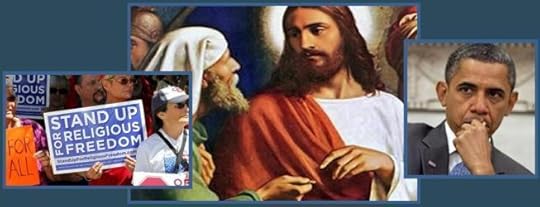Carl E. Olson's Blog, page 120
November 28, 2013
Happy Thanksgiving from Ignatius Insight and Insight Scoop!
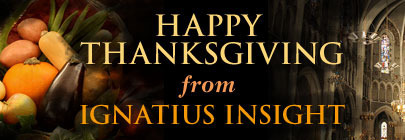
 Wishing You a Blessed and Happy Thanksgiving!
Wishing You a Blessed and Happy Thanksgiving!
Dear Readers:
Thanksgiving is a time-honored and cherished American tradition, rooted in the Christian belief that God is the source of all life and goodness, deserving our humble thanks and praise.
Here is a selection of thoughts and prayers from some Ignatius Press books and authors about thanksgiving and gratitude. They have helped me to reflect more deeply on the importance and necessity of thanksgiving. I hope you enjoy them.
Have a blessed and happy Thanksgiving!
Carl E. Olson
Editor, Ignatius Insight and Catholic World Report
 A Psalm for the thank offering:
A Psalm for the thank offering:
"Make a joyful noise to the Lord, all the lands!
"Serve the Lord with gladness! Come into his presence with singing!
"Know that the Lord is God!
It is he that made us, and we are his;
we are his people, and the sheep of his pasture.
"Enter his gates with thanksgiving,
and his courts with praise!
Give thanks to him, bless his name!
"For the Lord is good; his mercy endures for ever,
and his faithfulness to all generations."
- From Psalm 100 (99), in the New Testament and the Psalms
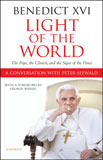 John Paul II once recounted that one day his father put a prayerbook with the "Prayer to the Holy Spirit" into his hands and told him that he should pray it daily. He then gradually understood what it means when Jesus says that the true worshippers of God are those who worship him "in spirit and truth". What does that mean?
John Paul II once recounted that one day his father put a prayerbook with the "Prayer to the Holy Spirit" into his hands and told him that he should pray it daily. He then gradually understood what it means when Jesus says that the true worshippers of God are those who worship him "in spirit and truth". What does that mean?
This passage in chapter 4 of John's Gospel is the prophecy of a worship in which there will no longer be any temple, but in which the faithful will pray without an external temple in the fellowship of the Holy Spirit and the truth of the Gospel, in communion with Christ; where what is needed is no longer a visible temple but rather the new fellowship with the risen Lord. That always remains important, because it signifies a major turning point in the history of religion as well.
And how does Pope Benedict pray?
As far as the Pope is concerned, he too is a simple beggar before God--even more than all other people. Naturally I always pray first and foremost to our Lord, with whom I am united simply by old acquaintance, so to speak. But I also invoke the saints. I am friends with Augustine, with Bonaventure, with Thomas Aquinas. Then one says to such saints also: Help me! And the Mother of God is, in any case, always a major point of reference. In this sense I commend myself to the communion of saints. With them, strengthened by them, I then talk with the dear Lord also, begging, for the most part, but also in thanksgiving--or quite simply being joyful.
- From "Popes Do Not Fall from the Sky", Chapter One of Light Of The World: The Pope, The Church and The Signs Of The Times, by Pope Benedict XVI and Peter Seewald
 "Our lives are involved with one another, through innumerable interactions they are linked together. No one lives alone. No one sins alone. No one is saved alone. The lives of others continually spill over into mine: in what I think, say, do and achieve. And conversely, my life spills over into that of others: for better and for worse. So my prayer for another is not something extraneous to that person, something external, not even after death. In the interconnectedness of Being, my gratitude to the other--my prayer for him--can play a small part in his purification. And for that there is no need to convert earthly time into God's time: in the communion of souls simple terrestrial time is superseded. It is never too late to touch the heart of another, nor is it ever in vain. In this way we further clarify an important element of the Christian concept of hope. Our hope is always essentially also hope for others; only thus is it truly hope for me too. As Christians we should never limit ourselves to asking: how can I save myself? We should also ask: what can I do in order that others may be saved and that for them too the star of hope may rise? Then I will have done my utmost for my own personal salvation as well."
"Our lives are involved with one another, through innumerable interactions they are linked together. No one lives alone. No one sins alone. No one is saved alone. The lives of others continually spill over into mine: in what I think, say, do and achieve. And conversely, my life spills over into that of others: for better and for worse. So my prayer for another is not something extraneous to that person, something external, not even after death. In the interconnectedness of Being, my gratitude to the other--my prayer for him--can play a small part in his purification. And for that there is no need to convert earthly time into God's time: in the communion of souls simple terrestrial time is superseded. It is never too late to touch the heart of another, nor is it ever in vain. In this way we further clarify an important element of the Christian concept of hope. Our hope is always essentially also hope for others; only thus is it truly hope for me too. As Christians we should never limit ourselves to asking: how can I save myself? We should also ask: what can I do in order that others may be saved and that for them too the star of hope may rise? Then I will have done my utmost for my own personal salvation as well."
-- From Spe Salvi (Saved In Hope) by Pope Benedict XVI
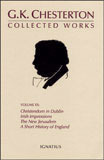 "In any intellectual corner of modernity can be found such a phrase as I have just read in a newspaper controversy: 'Salvation, like other good things, must not come from outside.' To call a spiritual thing external and not internal is the chief mode of modernist excommunication. But if our subject of study is mediaeval and not modern, we must pit against this apparent platitude the very opposite idea. We must put ourselves in the posture of men who thought that almost every good thing came from outside--like good news. I confess that I am not impartial in my sympathies here; and that the newspaper phrase I quoted strikes me as a blunder about the very nature of life. I do not, in my private capacity, believe that a baby gets his best physical food by sucking his thumb; nor that a man gets his best moral food by sucking his soul, and denying its dependence on God or other good things. I would maintain that thanks are the highest form of thought; and that gratitude is happiness doubled by wonder."
"In any intellectual corner of modernity can be found such a phrase as I have just read in a newspaper controversy: 'Salvation, like other good things, must not come from outside.' To call a spiritual thing external and not internal is the chief mode of modernist excommunication. But if our subject of study is mediaeval and not modern, we must pit against this apparent platitude the very opposite idea. We must put ourselves in the posture of men who thought that almost every good thing came from outside--like good news. I confess that I am not impartial in my sympathies here; and that the newspaper phrase I quoted strikes me as a blunder about the very nature of life. I do not, in my private capacity, believe that a baby gets his best physical food by sucking his thumb; nor that a man gets his best moral food by sucking his soul, and denying its dependence on God or other good things. I would maintain that thanks are the highest form of thought; and that gratitude is happiness doubled by wonder."
-- From "The Age of the Crusades", in The Collected Works of G.K. Chesterton, Vol. XX by G. K. Chesterton
 "In the literary corpus of Augustine--more than 1,000 publications divided into philosophical, apologetic, doctrinal, moral, monastic, exegetic and anti-heretical writings in addition precisely to the letters and homilies--certain exceptional works of immense theological and philosophical breadth stand out. First of all, it is essential to remember the Confessiones mentioned above, written in 13 books between 397 and 400 in praise of God. They are a sort of autobiography in the form of a dialogue with God. This literary genre actually mirrors St Augustine's life, which was not one closed in on itself, dispersed in many things, but was lived substantially as a dialogue with God, hence, a life with others. The title 'Confessiones' indicates the specific nature of this autobiography. In Christian Latin this word, confessiones, developed from the tradition of the Psalms and has two meanings that are nevertheless interwoven. In the first place confessiones means the confession of our own faults, of the wretchedness of sin; but at the same time, confessiones also means praise of God, thanksgiving to God. Seeing our own wretchedness in the light of God becomes praise to God and thanksgiving, for God loves and accepts us, transforms us and raises us to himself."
"In the literary corpus of Augustine--more than 1,000 publications divided into philosophical, apologetic, doctrinal, moral, monastic, exegetic and anti-heretical writings in addition precisely to the letters and homilies--certain exceptional works of immense theological and philosophical breadth stand out. First of all, it is essential to remember the Confessiones mentioned above, written in 13 books between 397 and 400 in praise of God. They are a sort of autobiography in the form of a dialogue with God. This literary genre actually mirrors St Augustine's life, which was not one closed in on itself, dispersed in many things, but was lived substantially as a dialogue with God, hence, a life with others. The title 'Confessiones' indicates the specific nature of this autobiography. In Christian Latin this word, confessiones, developed from the tradition of the Psalms and has two meanings that are nevertheless interwoven. In the first place confessiones means the confession of our own faults, of the wretchedness of sin; but at the same time, confessiones also means praise of God, thanksgiving to God. Seeing our own wretchedness in the light of God becomes praise to God and thanksgiving, for God loves and accepts us, transforms us and raises us to himself."
-- From Church Fathers: From Clement of Rome to Augustine by Pope Benedict XVI
 "For, if you will examine the familiar words of it, you will find that everywhere praise and thanksgiving are inextricably linked. When we praise God, we think of what is in himself high above us, infinitely greater than we are, wholly independent of us. But in the same breath we thank him for what he is to us, what he does for us. 'We praise thee, we bless thee, we adore thee, we glorify three, we give thanks to thee in the greatness of thy glory.' So, in the Gloria, we dispose ourselves for sacrifice; and when the sacrifice proper begins, we allow ourselves, for the moment, to forget even the duty of praising God, so overwhelmed are we by the thought of his benefits to us. 'Let us give thanks to the Lord our God. . . . It is fitting, it is right so to do. . . . Indeed it is fitting, it is right, it is to be expected of us, it is our hope of salvation, that always and everywhere we should give thee thanks.' For every mystery of our faith, from our Lady's child-bearing to the expectation of the faithful dead, it is always thanks we offer to God, just here."
"For, if you will examine the familiar words of it, you will find that everywhere praise and thanksgiving are inextricably linked. When we praise God, we think of what is in himself high above us, infinitely greater than we are, wholly independent of us. But in the same breath we thank him for what he is to us, what he does for us. 'We praise thee, we bless thee, we adore thee, we glorify three, we give thanks to thee in the greatness of thy glory.' So, in the Gloria, we dispose ourselves for sacrifice; and when the sacrifice proper begins, we allow ourselves, for the moment, to forget even the duty of praising God, so overwhelmed are we by the thought of his benefits to us. 'Let us give thanks to the Lord our God. . . . It is fitting, it is right so to do. . . . Indeed it is fitting, it is right, it is to be expected of us, it is our hope of salvation, that always and everywhere we should give thee thanks.' For every mystery of our faith, from our Lady's child-bearing to the expectation of the faithful dead, it is always thanks we offer to God, just here."
-- From Pastoral and Occasional Sermons by Ronald Knox
 "What great nation is there that has a god so near to it as the Lord our God is to us, whenever we call upon him?" (Deut 4:7)
"What great nation is there that has a god so near to it as the Lord our God is to us, whenever we call upon him?" (Deut 4:7)
"Saint Thomas Aquinas took up this saying in his reflections for the Feast of Corpus Christi. In doing so, he showed how we Christians in the Church of the New Covenant can pronounce these words with yet more reason and more joy and with thankfulness than Israel could in doing so, he showed how this saying , in the Church of Jesus Christ, has aqquired a depth of meaning hitherto unsuspected; God has truly come to dwell among us in the Eucharist."
- From God Is Near Us: The Eucharist, The Heart of Life by Joseph Cardinal Ratzinger (Pope Benedict XVI).
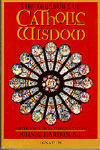 "Grace is always given to those ready to give thanks for it" (Thomas À Kempis).
"Grace is always given to those ready to give thanks for it" (Thomas À Kempis).
"Be loving and thankful to God for the least benefits that He gives you, and then you will be better prepared and more worthy to receive greater benefits from Him. Think that the least gift that he gives is great, and take the meanest things as special gifts and as great tokens of love. If the dignity of the Giver is well considered, no gift will seem little." (Thomas À Kempis)
"That we must recognize and acknowledge every good as a gift and that even the patient endurance of suffering for Christ's sake is of God. That we should not accept in silence the benefactions of God, but return thanks for them." (Rule 55 from St. Basil)
"And let those who will, laugh and scorn--I shall not be silent; nor shall I hide the signs and wonders which the Lord has shown me many years before they came to pass, as He knows everything even before the times of the world. Hence I ought unceasingly to give thanks to God Who often pardoned my folly and my carelessness, and on more than one occasion spared His great wrath on me, who was chosen to be His helper and who was slow to do as was shown me and as the Spirit suggested. And the Lord had mercy on me thousands and thousands of times..." (St. Patrick)
"...We are led to give thanks to God, because seeing that God is the Creator of all things, it is certain that all that we are, and all that we have come from God: hence the Apostle says: What hast thou that hou hast not received?--The earth is the Lord's and the fullness thereof, the world and all that dwell therein. For which reason we owe Him thanksgiving: What shall I render unto the Lord for all the things that he has rendered to me?" (St. Thomas Aquinas)
- From The Treasury of Catholic Wisdom, edited and with an introduction by John A. Hardon, S.J.
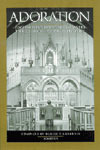 Act of Thanksgiving after Communion
Act of Thanksgiving after Communion
" I give Thee thanks, holy Lord, Father almighty, everlasting God, Who has vouchsafed to feed me, a sinner, Thine unworthy servant, for no merits of my own, but only out of the goodness of Thy great mercy, with the precious Body and Blood of Thy Son, our Lord Jesus Christ; and I pray Thee, that this holy Communion may be to me, not guilt for punishment, but a saving intercession for pardon. Let it be to me an armor of faith and a shield of good will. Let it be to me a casting out of vices; a driving away of all evil desires and fleshly lusts; an increase in charity, patience, humility, obedience, and all virtues; a firm defense against the plots of all my enemies, both seen and unseen; a perfect quieting of all motions of sin, both in my flesh and my spirit; a firm cleaving unto Thee, the only and true God, and a happy ending to my life. And I pray Thee to deign to bring me, a sinner, to that ineffable Feast, where Thou art withThy Son and the Holy Ghost, art to Thy holy ones true light, full satisfaction, everlasting joy, consummate pleasure and perfect happiness. Amen. (St.Thomas Aquinas)
From Adoration: Eucharistic Texts and Prayers Throughout Church History, Compiled by Daniel P. Guernsey
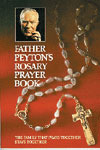 "The hungry he has filled with good things." Luke 1:53
"The hungry he has filled with good things." Luke 1:53
The second Joyful Mystery of the Rosary: In the first days of her pregnancy, Mary visited her cousin Elizabeth's home. There it was that she sang the "Magnificat." In this sudden song of the praise of God, she tells me a secret about my soul's food: "God fills the hungry." Mary wanted God, hungered after God, and God entrusted His Son to his care. God heaped "good things" on the table of her heart--His Son Jesus, "the fruit of her womb," was divine fruit for her soul.
"Christ in the Eucharist is my soul's food. Jesus fills my emptiness and satisfies my insatiable hunger."
- From Father Peyton's Rosary Prayer Book
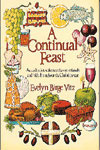 "The idea of a feast of thanksgiving has universal and venerable precedent. Gratitude to God (or to gods: the powers that be) for the fruitfulness of the earth is deeply rooted in the religious heart of man.
"The idea of a feast of thanksgiving has universal and venerable precedent. Gratitude to God (or to gods: the powers that be) for the fruitfulness of the earth is deeply rooted in the religious heart of man.
"The Jews had, and have today, three celebrations that are at least in part agricultural festivals: Passover, Pentecost, and Tabernacles or Succoth. Sacrifices were traditionally offered at the temple in thanksgiving for the harvest and festive meals held.
"Christianity brought a new perspective to the ancient tradition. 'Eucharist' itself means 'thanksgiving,' and God is thanked, sacrifice offered every time the Eucharist is celebrated. This is why the eucharistic feast became the fundamental Christian meal, imparting beauty and symbolism to all other feasts."
"The thanksgiving banquet is, in all its many forms, a beautiful tradition."
- From A Continual Feast: A cookbook to celebrate the joys of family and faith throughout the Christian year by Evelyn Birge Vitz
[image error] "Thanksgiving: Closely akin to adoration and praise, and yet with an added dimension, is heartfelt thanksgiving. Repeatedly the psalmist and the Church hearken to our privilege and duty of expressing gratitude to the Father for every good and perfect gift that descends from him (Jas 1:17). All of us are to declare to this God an endless proclamation of thanksgiving (cf. Ps 28:7; Col 3:15). ...
"First of all, deep in every human heart is a need to worship and to thank. One of the frustrations the atheist has to face (as Chesterton pointed out) is to experience the innocence of a baby's face or the splendor of a nighttime sky and then have no one to thank for it. And because we are social beings, we need on occasion to express this gratitude and adoration with other people. We need liturgy."
-- From Prayer Primer: Igniting a Fire Within, by Fr. Thomas Dubay, S.M.
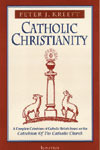 Commenting on the prayer of thanksgiving (CCC 2603, 2637-8):
Commenting on the prayer of thanksgiving (CCC 2603, 2637-8):
"The evangelists have preserved. . . explicit prayers offered by Christ during his public ministry" [Mt 11:25-27 and Lk 10:21-23]. "Each begins with thanksgiving" (CCC 2603). The same is true of the prayer given in Jn 11:41-42.
It is always healing to our spirits to "count our blessings" and thank God for everything that is good. It is also realistic, or honest to reality. For whatever means he uses-nature, family, friends, our own talents-it is God who is the First Cause of all life and goodness (and not of death and sin). In the poorest life there are always immeasurable riches to thank God for. Everyone's "blessing list" should include at least:
a. Life itself and time and family and friends and our own mental and spiritual powers and the many little pleasures that are always available in this world;
b. our very existence; for the birth of each one of us was designed and willed from eternity by the Creator (our parents were only our "pro-creators");
c. salvation from sin and the hope of heaven; that is, infinite and unimaginable joy in intimate union with God forever;
d. God's patient, daily grace in making us holy and good and able to enjoy him more in eternity. Even when we have few earthly gifts, we have God (sometimes, only then!). "The Giver is more precious than the gift" (CCC 2604).
Our gratitude, too, should be Christocentric. If we do not feel grateful, we should turn again to the crucifix. That is what God did for us. We should practice giving thanks especially when we do not feel thankful, for that is when we need to most. "Give thanks in all circumstances,- for this is the will of God in Christ Jesus for you" (I Thess 5: 18).
- From Peter J. Kreeft, Catholic Christianity: A Complete Catechism of Catholic Beliefs based on the Catechism of the Catholic Church
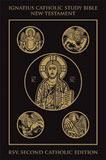 "After this I looked, and behold, a great multitude which no man could number, from every nation, from all tribes and peoples and tongues, standing before the throne and before the Lamb, clothed in white robes, with palm branches in their hands, and crying out with a loud voice, 'Salvation belongs to our God who sits upon the throne, and to the Lamb!'
"After this I looked, and behold, a great multitude which no man could number, from every nation, from all tribes and peoples and tongues, standing before the throne and before the Lamb, clothed in white robes, with palm branches in their hands, and crying out with a loud voice, 'Salvation belongs to our God who sits upon the throne, and to the Lamb!'
And all the angels stood round the throne and round the elders and the four living creatures, and they fell on their faces before the throne and worshiped God, saying, 'Amen! Blessing and glory and wisdom and thanksgiving and honor and power and might be to our God for ever and ever! Amen.'
Then one of the elders addressed me, saying, 'Who are these, clothed in white robes, and whence have they come?' I said to him, 'Sir, you know.'
And he said to me, 'These are they who have come out of the great tribulation; they have washed their robes and made them white in the blood of the Lamb.'"
-- From Revelation 7:9-14, in the Ignatius Catholic Study Bible (New Testament, RSVCE)
November 27, 2013
“I Haven’t Killed Anyone!” What Serious Sins Will Exclude Us From the Kingdom of God?
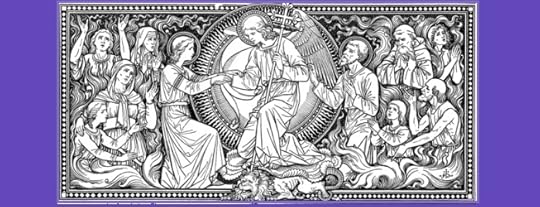
by Ralph Martin | Homiletic & Pastoral Review
Why aren’t we more concerned about how even many of our fellow Catholics are engaging in behaviors (“lifestyles”), or accepting, or even approving them, in others, that scripture says will exclude them from the kingdom?
Right after Vatican II, there was an explosion of interest in moral theology. The “fundamental option” theory gained wide notice in both scholarly journals and in popular Catholic culture. Many people got the impression—and many still have it—that if one’s overall life is pointed in a good direction, particular sinful acts may not exclude us from the kingdom. This interpretation was definitively rejected in Blessed John Paul II’s important encyclical on the moral life, Veritatis Splendor.(Henceforth, VS)
The Pope definitively taught, in continuity with the Church’s tradition, that particular acts can change our fundamental option, and that we can’t dissociate a fundamental option “for God” from particular acts of the body that contradict such an option. The Pope reaffirmed the teaching of the Council of Trent and of Scripture, that our salvation can be lost, not only by acts of apostasy by which faith itself is lost, but also by any other mortal sin. The Pope repeats the usual teaching that mortal sin involves grave matter, sufficient reflection, and full consent of the will. (VS 49, 67- 68)
Another source of confusion after Vatican II were trends in moral theology that exalted the role of individual conscience in making moral choices, without sufficiently stressing that we have an obligation to seek out the truth about what is right and wrong, and act in accordance with it, as opposed to “deciding for ourselves” what we think is right and wrong.
Again, (soon to be “Saint”) John Paul II taught that the moral law is to be recognized, discovered in the reflection of reason and attention to Divine Revelation, and that conscience is the application of this natural—embedded in human nature and susceptible to discovery by the intellect—and divine—explicitly and fully revealed in the Sacred Scripture—moral law in particular circumstances. The moral law is to be discovered and obeyed, with the help of grace, not “thought up” or “made up,” or “received” from a post-Christian culture, or determined by what is legal, or by what the majority think is right or wrong, or a by pastiche of personal opinions and preferences. (VS 36, 40, 58-60)
And like Vatican II, Veritatis Splendor called for a greater attention to Sacred Scripture in the grounding of moral theology. Let’s look now at some particular texts of Scripture that spell out in some detail what acts will exclude us from the kingdom of God, if not repented from. Before we do so, let’s recall the way the Catholic Church views the authority and reliability of Scripture.
Since, therefore, all that the inspired authors, or sacred writers, affirm should be affirmed by the Holy Spirit, we must acknowledge that the books of Sacred Scripture, firmly, faithfully and without error, teach that truth which God, for the sake of our salvation, wished to see confided to the sacred Scriptures. (Dei Verbum 11).
And now some important texts (I’m bolding some sentences for emphasis):
Facing the Fallout of Artificial Reproductive Technologies
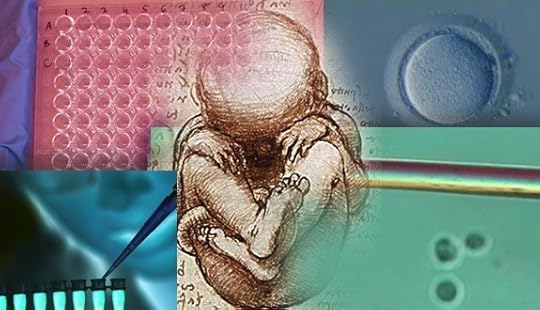
Facing the Fallout of Artificial Reproductive Technologies | Carrie Gress | CWR
An interview with Jennifer Lahl, founder and president of the Center for Bioethics and Culture
“Egg or sperm donors don’t help other people have children, they help other people have their children,” says Jennifer Lahl, founder and president of the Center for Bioethics and Culture.
Lahl spoke with Catholic World Report about her work to assist the most defenseless affected by the rapidly changing and largely unregulated world of biotechnology.
The CBC has produced three original, award-winning documentary films: Anonymous Father’s Day (2011), about children of sperm donors who long to know more about their biological fathers; Eggsploitation (2010), which uncovers the serious risks associated with human egg donation; and Lines That Divide (2009), focusing upon the stem-cell research debate.
CWR: Your work at the Center for Bioethics and Culture tries to help the most vulnerable affected by biotechnology. Other than, say, “spare embryos” from IVF, who else are you looking to assist?
Lahl: Our work focuses on end-of-life issues, like euthanasia, and “making life” issues via assisted reproductive technologies. The most vulnerable we seek to give a voice to are those facing terminal illness, disabilities, [the] suffering (those society says have a life not worth living), and also the stakeholders in assisted reproductive technology (ART), e.g., egg donors, surrogate mothers, and the children created by these technologies.
Of course, we do advocate against sperm donation too, and it may be a stretch to say a sperm donor is vulnerable, but we seek to educate them on the realities of donor conception. I often say to egg donors (and it could be said of sperm donation), you didn’t help a woman (or a couple or man) have a baby, you helped her have your baby.
CWR: The intense emotional desire to be a parent is the main motivation behind surrogacy and technologies like IVF. Your work, however, especially your films, focuses on different sets of emotions beyond those of potential parents. Tell us about those.
November 26, 2013
A helpful summary of the Apostolic Exhortation, "Evangelii Gaudium"
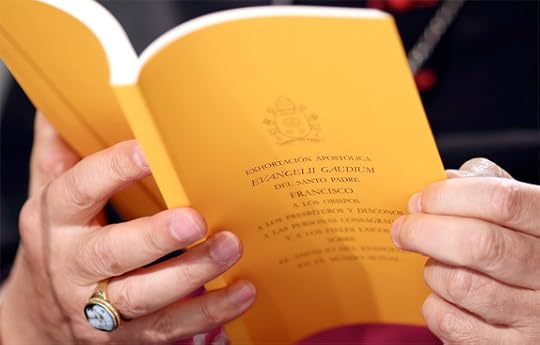
A copy of the apostolic exhortation "Evangelii Gaudium" ("The Joy of the Gospel") by Pope Francis is seen during a news conference at the Vatican Nov. 26. (CNS photo/Alessandro Bianchi, Reuters)
by Carl E. Olson
Via Vatican Information Services, a good guide to the Holy Father's Apostolic Exhoration, which is over 52,000 words long (Benedict XVI's Apostolic Exhoration, "Verbum Domini", was about 47,000 words long):
SYNTHESIS OF THE APOSTOLIC EXHORTATION “THE JOY OF THE GOSPEL”
Vatican City, 26 November 2013 (VIS) - “The joy of the Gospel fills the hearts and lives of all who encounter Jesus”; thus begins the Apostolic Exhortation “Evangelii Gaudium”, by which Pope Francis develops the theme of the proclamation of the Gospel in the contemporary world, drawn from, among other sources, the contribution of the work of the Synod held in the Vatican from 7 to 28 October 2012 on the theme “The new evangelization for the transmission of the faith”. The text, which the Holy Father consigned to a group of thirty-six faithful following the closing Mass of the Year of Faith last Sunday is the first official document of his pontificate, since the Encyclical “Lumen fidei” was written in collaboration with his predecessor, Benedict XVI. “I wish to encourage the Christian faithful to embark upon a new chapter of evangelization marked by this joy, while pointing out new paths for the Church’s journey in years to come”, he continues. It is a heartfelt appeal to all baptized persons to bring Christ’s love to others, “permanently in a state of mission”, conquering “the great danger in today’s world”, that of an individualist “desolation and anguish”.
The Pope invites the reader to “recover the original freshness of the Gospel”, finding “new avenues” and “new paths of creativity”, without enclosing Jesus in our “dull categories”. There is a need for a “pastoral and missionary conversion, which cannot leave things as they presently are” and a “renewal” of ecclesiastical structures to enable them to become “more mission-oriented”. The Pontiff also considers “a conversion of the papacy”, to help make this ministry “more faithful to the meaning which Jesus Christ wished to give it and to the present needs of evangelization”. The hope that the Episcopal Conferences might contribute to “the concrete realization of the collegial spirit”, he states, “has not been fully realized”. A “sound decentralization” is necessary. In this renewal, the Church should not be afraid to re-examine “certain customs not directly connected to the heart of the Gospel, even some of which have deep historical roots”.
A sign of God’s openness is “that our church doors should always be open” so that those who seek God “will not find a closed door”; “nor should the doors of the sacraments be closed for simply any reason”. The Eucharist “is not a prize for the perfect but a powerful medicine and nourishment for the weak”. These convictions have pastoral consequences that we are called to consider with prudence and boldness”. He repeats that he prefers “a Church which is bruised, hurting and dirty because it has been out on the streets, rather than a Church … concerned with being at the centre and then ends by being caught up in a web of obsessions and procedures. If something should rightly disturb us … it is the fact that many of our brothers and sisters are living without … the friendship of Jesus Christ”.
The Pope indicates the “temptations which affect pastoral workers”: “individualism, a crisis of identity and a cooling of fervour”. The greatest threat of all is “the grey pragmatism of the daily life of the Church, in which all appears to proceed normally, which in reality faith is wearing down”. He warns against “defeatism”, urging Christians to be signs of hope, bringing about a “revolution of tenderness”. It is necessary to seek refuge from the “spirituality of well-being … detached from responsibility for our brothers and sisters” and to vanquish the “spiritual worldliness” that consists of “seeking not the Lord’s glory but human glory and well-being”. The Pope speaks of the many who “feel superior to others” because “they remain intransigently faithful to a particular Catholic style from the past” whereby “instead of evangelizing, one analyses and classifies others” and those who have “an ostentatious preoccupation for the liturgy, for doctrine and for the Church’s prestige, but without any concern that the Gospel have a real impact” on the needs of the people. This is “a tremendous corruption disguised as a good … God save us from a worldly Church with superficial spiritual and pastoral trappings!”.
He appeals to ecclesial communities not to fall prey to envy and jealousy: “How many wars take place within the people of God and in our different communities!”. “Whom are we going to evangelize if this is the way we act?”. He highlights the need to promote the growth of the responsibility of the laity, often kept “away from decision-making” by “an excessive clericalism”. He adds that there is a need for “still broader opportunities for a more incisive female presence in the Church”, in particular “in the various settings where important decisions are made”. “Demands that the legitimate rights of women be respected … cannot be lightly evaded”. The young should “exercise greater leadership”. With regard to the scarcity of vocations in many places, he emphasizes that “seminaries cannot accept candidates on the basis of any motivation whatsoever”.
With regard to the theme of inculturation, he remarks that “Christianity does not have simply one cultural expression” and that the face of the Church is “varied”. “We cannot demand that peoples of every continent, in expressing their Christian faith, imitate modes of expression which European nations developed at a particular moment of their history”. The Pope reiterates that “underlying popular piety … is an active evangelizing power” and encourages the research of theologians, reminding them however that “the Church and theology exist to evangelize” and urging them not to be “content with a desk-bound theology”.
He focuses “somewhat meticulously, on the homily”, since “many concerns have been expressed about this important ministry and we cannot simply ignore them”. The homily “should be brief and avoid taking on the semblance of a speech or a lecture”, should be a “heart-to-heart communication” and avoid “purely moralistic or doctrinaire” preaching. He highlights the importance of preparation: “a preacher who does not prepare is not ‘spiritual’; he is dishonest and irresponsible”. Preaching should always be positive in order always to “offer hope” and “does not leave us trapped in negativity”. The approach to the proclamation of the Gospel should have positive characteristics: “approachability, readiness for dialogue, patience, a warmth and welcome which is non-judgemental”.
In relation to the challenges of the contemporary world, the Pope denounces the current economic system as “unjust at its root”. “Such an economy kills” because the law of “the survival of the fittest” prevails. The current culture of the “disposable” has created “something new”: “the excluded are not the ‘exploited’ but the outcast, the ‘leftovers’”. “A new tyranny is thus born, invisible and often virtual”, of an “autonomy of the market” in which “financial speculation” and “widespread corruption” and “self-serving tax-evasion reign”. He also denounces “attacks on religious freedom” and the “new persecutions directed against Christians. … In many places the problem is more that of widespread indifference and relativism”. The family, the Pope continues, “is experiencing a profound cultural crisis”. Reiterating the indispensable contribution of marriage to society”, he underlines that “the individualism of our postmodern and globalized era favours a lifestyle which … distorts family bonds”.
He re-emphasizes “the profound connection between evangelization and human advancement” and the right of Pastors “to offer opinions on all that affects people’s lives”. “No one can demand that religion should be relegated to the inner sanctum of personal life, without a right to offer an opinion on events affecting society”. He quotes John Paul II, who said that the Church “cannot and must not remain on the sidelines in the fight for justice”. “For the Church, the option for the poor is primarily a theological category” rather than a sociological one. “This is why I want a Church that is poor and for the poor. They have much to teach us”. “As long as the problems of the poor are not radically resolved … no solution will be found for this world’s problems”. “Politics, although often denigrated”, he affirms, “remains a lofty vocation and one of the highest forms of charity”. I beg the Lord to grant us more politicians who are genuinely disturbed by … the lives of the poor!”. He adds an admonition: “Any Church community”, if it believes it can forget about the poor, runs the risk of “breaking down”.
The Pope urges care for the weakest members of society: “the homeless, the addicted, refugees, indigenous peoples, the elderly who are increasingly isolated and abandoned” and migrants, for whom the Pope exhorts “a generous openness”. He speaks about the victims of trafficking and new forms of slavery: “This infamous network of crime is now well established in our cities, and many people have blood on their hands as a result of their comfortable and silent complicity”. “Doubly poor are those women who endure situations of exclusion, mistreatment and violence”. “Among the vulnerable for whom the Church wishes to care with particular love and concern are unborn children, the most defenceless and innocent among us. Nowadays efforts are made to deny them their human dignity”. “The Church cannot be expected to change her position on this question … it is not ‘progressive’ to try to resolve problems by eliminating a human life”. The Pope makes an appeal for respect for all creation: we “are called to watch over and protect the fragile world in which we live”.
With regard to the theme of peace, the Pope affirms that “a prophetic voice must be raised” against attempts at false reconciliation to “silence or appease” the poor, while others “refuse to renounce their privileges”. For the construction of a society “in peace, justice and fraternity” he indicates four principles: “Time is greater than space” means working “slowly but surely, without being obsessed with immediate results”. “Unity prevails over conflict” means “a diversified and life-giving unity”. “Realities are more important than ideas means avoiding “reducing politics or faith to rhetoric”. “The whole is greater than the part” means bringing together “globalization and localization”.
“Evangelization also involves the path of dialogue”, the Pope continues, which opens the Church to collaboration with all political, social, religious and cultural spheres. Ecumenism is “an indispensable path to evangelization”. Mutual enrichment is important: “we can learn so much from one another!”, for example “in the dialogue with our Orthodox brothers and sisters, we Catholics have the opportunity to learn more about the meaning of Episcopal collegiality and their experience of synodality”; “dialogue and friendship with the children of Israel are part of the life of Jesus’ disciples”; “interreligious dialogue”, which must be conducted “clear and joyful in one’s own identity”, is “a necessary condition for peace in the world” and does not obscure evangelization; in our times, “our relationship with the followers of Islam has taken on great importance”: the Pope “humbly” entreats those countries of Islamic tradition to guarantee religious freedom to Christians, also “in light of the freedom which followers of Islam enjoy in Western countries!”. “Faced with disconcerting episodes of violent fundamentalism” he urges us to “avoid hateful generalisations, for authentic Islam and the proper reading of the Koran are opposed to every form of violence”. And against the attempt to private religions in some contexts, he affirms that “the respect due to the agnostic or non-believing minority should not be arbitrarily imposed in a way that silences the convictions of the believing majority or ignores the wealth of religious traditions”. He then repeats the importance of dialogue and alliance between believers and non-believers.
The final chapter is dedicated to “spirit-filled evangelizers”, who are those who are “fearlessly open to the working of the Holy Spirit” and who have “the courage to proclaim the newness of the Gospel with boldness (parrhesía) in every time and place, even when it meets with opposition”. These are “evangelizers who pray and work”, in the knowledge that “mission is at once a passion for Jesus and a passion for his people”: “Jesus wants us to touch human misery, to touch the suffering flesh of others”. He explains, “In our dealings with the world, we are told to give reasons for our hope, but not as an enemy who critiques and condemns”. “Only the person who feels happiness in seeking the good of others, in desiring their happiness, can be a missionary”; “if I can help at least one person to have a better life, that already justifies the offering of my life”. The Pope urges us not to be discouraged before failure or scarce results, since “fruitfulness is often invisible, elusive and unquantifiable”; we must know “only that our commitment is necessary”. The Exhortation concludes with a prayer to Mary, “Mother of Evangelization”. “There is a Marian “style” to the Church’s work of evangelization. Whenever we look to Mary, we come to believe once again in the revolutionary nature of love and tenderness”.
• The Apostolic Exhortation “Evangelii Gaudium” on the Vatican site.
• A PDF version of the document, also from the Vatican site
November 25, 2013
New: "Figuring out the Church: Her Marks, and Her Masters" by Aidan Nichols, OP
Now available from Ignatius Press:
Figuring out the Church: Her Marks, and Her Masters
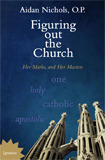
by Aidan Nichols, OP
• Also available in Electronic Book Format
The Church is a mystery. Believers who want to enter more deeply into that mystery will reflect on the Church's basic characteristics, the "marks of the Church": what it means for the Church to be one, holy, catholic, and apostolic. Non-Catholics and nonbelievers looking to appreciate how Catholics regard the Church also will desire to understand these "marks".
In this book, renowned Dominican theologian Fr. Aidan Nichols explores the Church's characteristics. Drawing on insights from four theological masters-Henri de Lubac, Jean Tillard, Hans Urs von Balthasar, and Charles Journet-Nichols seeks to help Catholics and non-Catholics to "figure out" the Church, on at least a fundamental level. The four masters in question do not claim to exhaust the mystery of the Church, nor does Nichols. They do, however, assist the reader in going deeper into the mystery.
To accomplish this goal, Nichols appeals to both the Scholastic tradition and authors influenced by the ressourcement movement in theology. In this way, he provides readers with a sense of Catholicism's breadth, which is at once orthodox and yet generously conceived.
Fr. Aidan Nichols, O.P., a Dominican priest, is currently the John Paul II Memorial Visiting Lecturer, University of Oxford. He is the author of numerous books including Lovely Like Jerusalem, Looking at the Liturgy, Holy Eucharist, and The Thought of Benedict XVI. \
Praise for Figuring out the Church:
"Fr. Nichols takes an extremely complex and important topic -- the Church's holiness, unity, catholicity, and apostolicity -- and delivers a marvelously limpid, succinct, and balanced theological portrait. He lovingly illuminates the Church herself, the mystery of communion with the God the Father in Christ and the Holy Spirit. No contemporary work on the Church comes close to the level of Father Nichols's achievement here."
- Matthew Levering, Chair of Dogmatic Theology, Mundelein Seminary
"A brilliant explanation of the characteristics of the Church. Nichols offers the reader a clear summary of the ‘marks' that are the key to apologetics and ecclesiology."
- Fr. Kenneth Baker, SJ, Author, Inside the Bible
"This work draws together the seminal contributions in twentieth century and contemporary ecclesiology. Nichols is sensitive to the different nuances found across the spectrum of theological traditions, including Eastern Orthodoxy. It is simply the best work available for understanding the fundamental elements of Catholic ecclesiology. It is also a case study in how to present scholastic material without putting readers to sleep. Nichols can be read for the sheer beauty of his prose."
- Professor Tracey Rowland, John Paul II Institute, Melbourne, Australia
November 24, 2013
The Eucharist and the Rule of Christ

The Eucharist and the Rule of Christ | Fr. James T O'Connor | From The Hidden Manna: A Theology of the Eucharist (2nd edition) | Ignatius Insight
God the Father has put everything under Christ's dominion, and he shall rule until all powers opposed to him have been subdued, the last of them being death itself (cf. 1 Cor. 15:25-26). This present stage of Christ's rule is something we often profess in the liturgy (especially in the Feast of Christ the King) and in private devotion.
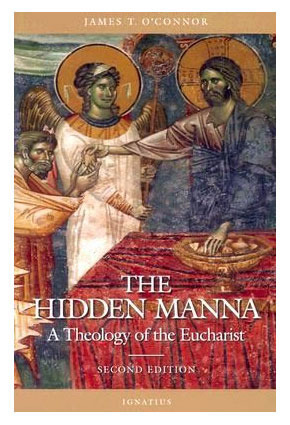 The meaning of the Lord's subjection of all reality in its present stage is, however, something upon which most of us do not often reflect. It means that, in some mysterious but real way, the risen Jesus influences, shapes, and directs all things so that out of all persons and things he is shaping the future visage of creation as that creation moves toward his glorious return. Even the sinner—whose very sin is at least implicitly an attempt to thwart the sovereignty and dominion of Christ—operates now within the overall plan of the Lord for the establishment of his Kingdom.
The meaning of the Lord's subjection of all reality in its present stage is, however, something upon which most of us do not often reflect. It means that, in some mysterious but real way, the risen Jesus influences, shapes, and directs all things so that out of all persons and things he is shaping the future visage of creation as that creation moves toward his glorious return. Even the sinner—whose very sin is at least implicitly an attempt to thwart the sovereignty and dominion of Christ—operates now within the overall plan of the Lord for the establishment of his Kingdom.
The ways in which Jesus exercises this dominion vary. Over creatures to whom he has given intelligence and free will, his action is such that it respects his natural gifts. Nonetheless, his power to move us by attraction, the arranging of circumstances, the example of others, the holy inspiration that comes from the reading of Scripture, interior grace that conveys the delectatio spoken of by Augustine— these and many other ways are some of the means by which he reigns efficaciously over intelligent creatures. As Vatican Council II said:
Constituted Lord by his Resurrection. Christ, to whom all power in heaven and on earth has been given, already works in the hearts of men by virtue of his Holy Spirit, not only stirring up a desire for the age to come but by that very fact also animating, purifying, and strengthening the noble intentions by which the human family strives to make its life more human and to subject all the earth to that goal. [16]
Over the lesser beings of creation his power sometimes is not necessarily more powerful (for his attractiveness and inspirations are powerful indeed) but more direct and immediate. And such is the case with the elements of bread and wine, simultaneously products of his creation and of ours, "fruit of the earth and work of human hands". At the Consecration of the liturgy, the heavenly King touches these elements directly by and through the power of his Spirit. He touches them so mightily that—if we may put it this way—he extracts from them their very reality, dominating it and attracting it (forcefully pulling it even) toward himself, so subjecting it to himself that its own true being is lost to it as it becomes the very Lord who has mastered it.
The mystery of transubstantiation is a totally marvelous change but not one wherein the Lord descends from heavenly glory to "enter" under the appearances of bread and wine. Rather it is one in which he, not coming down, lifts the creaturely realities to himself, drawing them up to where he is now with the Father. He draws them to himself in such a fashion that he subjugates them and so transforms their own being that it becomes identical with his. The very being of bread and wine is lifted out of itself in a mighty spiral of ascent, is subsumed by and converted into the reality of Jesus seated in glory. By drawing the reality of all the elements scattered throughout the world unto and into himself, Jesus maintains his own bodily unity. The elements are changed into him, not he into them. If he did to the appearances, the species, what he does to the very reality of the bread and wine, then, once the Consecration of the Mass was finished, the priest would be left with nothing before him on the paten or in the cup, and Christ would appear in glory. For then not only the being but the very appearances that manifest that being to the world would have been subsumed into the exalted Lord, and human history on earth would have reached its conclusion. [17]
Myles Connolly has caught this truth well in his little book Mr. Blue. There the book's hero, Blue, gives an imaginative scenario of the kingdom of the Antichrist. The last priest on earth, hunted by a universal dictatorial government, has determined to offer the Mass one last time. He goes to the roof of a building, vests, and begins the liturgy. His "treason " discovered, a plane is sent to bomb the building on top of which he is celebrating. The target sighted, the bomb is prepared for deployment just as the priest reaches the consecratory words of the Roman Canon: Hoc est enim corpus meum.
There was a moment of awful silence. Then, a burst of light beside which day itself is dark.... The earth burst asunder. And through this unspeakably luminous new day, through the vault of the sky ribbed with lightning, came Christ as he had come after the Resurrection. It was the end of the world! [18]
It is fantasy, of course, but it is also real in that it is founded on a truth. Were Christ to let happen to the sacramental Species or appearances what should follow from the change of reality in which they formally had their being, it would be the Parousia, the Second Coming in bodily appearance of [he Lord. If, developing the imagery of St. John Chrysostom, [19] we may use yet another fantasy, one created by Lewis Carroll, to help with an analogy to illustrate what is being said, then let us imagine what it would be like not to have the Sacred Host or the Precious Blood pass into our mouths but rather to have us be enabled to pass directly into them.






To have us pass, that is, through what remains of the bread and wine, viz., their appearances. Were we able to do this, we should find that, having passed through the appearances, we would be standrng with Christ in heaven itself, at the Father's right hand. And not only would we be standing there, but everyone who, anywhere in the world, was capable of doing the same thing, would be standing there with us united in Christ. This would be so because the Eucharistic appearances are themselves the boundary between the visible and invisible orders of creation, the horizon at which earthly time and the everlasting aeon of the blessed touch. The appearances are the window whose far side holds "what God has prepared for those who love him" (1 Cor 2:9).
The analogy may appear to contain more of Lewis Carroll than of reality. In fact, however, the reality of the Eucharistic Presence is in itself and in its consequences (for time, geography, spatiotemporal relationships, and interpersonal relationships) more fantastic than fantasy. It is more true, more real than the narrow, almost one-dimensional view of reality from which we often suffer because of contracted intellectual vision. It was a wideness of vision vis-à-vis reality that nourished the imaginations of a Leonardo da Vinci, a Jules Verne, and so much of yesterday's "science fiction". The first glimpse may at times have distorted the reality, but so much of yesterday's fantasy is, in essence, the quickly superseded "fact" of today. The potentialities latent in God's universe have only begun to be realized by mankind . Indeed, one of the "side benefits" of his revelation of some aspects of his Mysteries is that it compels us to stretch our minds and imaginations to make room for the not-yet-experienced, the wonderful, the awesome.
By the Christian Mysteries philosophy is enriched and experiential science is challenged. And certainly this is preeminently true of the Mystery of the Eucharist. By its very nature, this Mystery touches upon the natural and philosophic "mysteries" of time, place, the nature of matter and of human bodies, their physical and metaphysical structures, the visible and invisible realms of the universe, their relatedness and compenetrability, etc. Just as he stretches the heart, so the Eucharistic Christ stretches the mind. The analogy given above limps, not because it is "fantastic" but simply because it is not daring enough.
By his power, then, as Universal Lord to attract all things to himself, Christ "lifts" the creaturely realities of bread and wine, draws them to himself, changes them into himself, leaving the appearance of the earthly realities as vehicles for the heavenly exchange by which he physically comes to us as our food while drawing us to himself through and in the Eucharistic species.
In this way we can be helped to understand the affirmations of Aquinas and Paul VI. The Lord himself is not moved locally, nor is he locally "in place"; what "happens" to the Sacrament happens to the appearances. It is they that are doubly consecrated, moved, broken, multiplied in many ciboria and churches throughout the world, etc. Having been, however, "destructured" of any real being of their own and preserved miraculously, the appearances of what were bread and wine mediate to all who touch them, receive them, worship before them the Person whose Flesh and Blood they contain and whose reality their own former reality has become.
Thus, what happens to the appearances directly happens to the Lord's Body and Blood per accidens, since it is only through the sacramental species that he is physically accessible at all on this side of the divide that separates the visible and invisible dimensions of creation, both of which already contain spiritual and material-physical elements.
ENDNOTES:
[16] Vatican Council II, Guadium et Spes, 38.
[17] St. Thomas (Summa Contra Gentes, IV, 63, 12) appears to contradict this opinion. His remarks, however, are predicated on the presumption that Christ would not will the end of the world at such a moment.
[18] Myles Connolly, Mr. Blue (Garden City, N.Y. ; Doubleday, Image, 1961), pp. 63-64.
[19] Cf. above. Section I, pp. 46-48.
Related IgnatiusInsight.com Articles and Book Excerpts:
• The Spirit of the Liturgy page
• For "Many" or For "All"? | From God Is Near Us: The Eucharist, the Heart of Life | Joseph Cardinal Ratzinger
• Foreword to U.M. Lang's Turning Towards the Lord: Orientation in Liturgical Prayer | Joseph Cardinal Ratzinger
• Music and Liturgy | From The Spirit of the Liturgy | Joseph Cardinal Ratzinger
• The Altar and the Direction of Liturgical Prayer | From The Spirit of the Liturgy | Joseph Cardinal Ratzinger
• Benedict and the Eucharist: On the Apostolic Exhortation, Sacramentum Caritatis | Carl E. Olson
• Abbot Vonier and the Christian Sacrifice | Aidan Nichols, O.P.
• The Meaning and Purpose of the Year of the Eucharist | Carl E. Olson
• The Doctrine (and the Defense) of the Eucharist | Carl E. Olson
• Walking To Heaven Backward | Interview with Father Jonathan Robinson of the Oratory
• Rite and Liturgy | Denis Crouan, STD
• The Liturgy Lived: The Divinization of Man | Jean Corbon, OP
• The Mass of Vatican II | Fr. Joseph Fessio, S.J.
• The Eucharist: Source and Summit of Christian Spirituality | Mark Brumley
• Eucharistic Adoration: Reviving An Ancient Tradition | Valerie Schmalz
Fr. James O'Connor was a professor of theology for twenty-three years at St. Joseph's Seminary, Dunwoodie. He is now the pastor of St. Joseph's Parish, Millbrook, New York.
Ignatius Press to release Pope Francis’ first Apostolic Exhortation
‘The Joy of the Gospel’ (Evangelii Gaudium) available soon in hardcover
SAN FRANCISCO, Nov. 23, 2013 – Pope Francis is an evangelist, someone who spreads the good news about God’s love for us in Jesus Christ. Francis’ humble, compassionate style and direct, yet thoughtful, manner of speaking has won him an audience among Catholic and non-Catholic alike.
In his The Joy of the Gospel 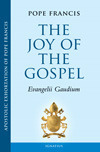 (Evangelii Gaudium), Pope Francis challenges all Christians to participate in the work of evangelizing — of sharing Christ’s love with others. This book is Francis’ first Apostolic Exhortation, a teaching document on a particular theme to encourage and challenge people. The Joy of the Gospel addresses the key subjects of the recent Synod of Bishops, which focused on the New Evangelization, an essential topic for the recent popes.
(Evangelii Gaudium), Pope Francis challenges all Christians to participate in the work of evangelizing — of sharing Christ’s love with others. This book is Francis’ first Apostolic Exhortation, a teaching document on a particular theme to encourage and challenge people. The Joy of the Gospel addresses the key subjects of the recent Synod of Bishops, which focused on the New Evangelization, an essential topic for the recent popes.
Ignatius Press is slated to release the book as a high-quality, hardcover, deluxe edition in December.
“Pope Francis is an evangelist extraordinaire,” said Ignatius Press President Mark Brumley. “He challenges us to grow in faith and to share our faith with others. That's what the ‘joy of the Gospel’ is all about. Ignatius Press is honored to make available Pope Francis' first apostolic exhortation in this special deluxe edition.”
The highly anticipated The Joy of the Gospel will answer a number of evangelization-related questions, including: How to foster conversion in the Church in order to make her people more faithful and effective in communicating God’s love to others? Why is the place of missions in the modern world? What are the obstacles believers’ own lives sometimes place in the way of others’ coming to faith? What are the questions people have about faith? What attitudes make it hard for people to be receptive to the Christian message? How does Jesus answer the most fundamental questions of human existence? Is there a difference between evangelizing and proselytizing, between proposing faith and imposing it?
Pope Francis’ presentation of the Gospel is both timeless and timely. He proclaims the perennial Christian message in ways that engage the contemporary world. He calls upon all followers of Jesus to be humble and yet bold in sharing the Gospel with others and to embody that teaching in their own lives.
For more information, to request review copies or to schedule an interview with Mark Brumley, please contact Kevin Wandra (404-788-1276 or KWandra@CarmelCommunications.com) of Carmel Communications.
Abp. Joseph Kurtz on Faith, Family, and Francis
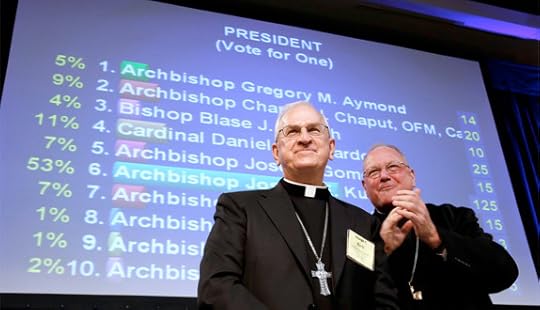
New York Cardinal Timothy M. Dolan applauds the election of Archbishop Joseph E. Kurtz of Louisville, Ky., as the next president of the U.S. Conference of Catholic Bishops Nov. 12 in Baltimore. (CNS photo/Nancy Phelan Wiechec) (Nov. 12, 2013)
Abp. Joseph Kurtz on Faith, Family, and Francis | Jim Graves | CWR
The new President of the USCCB discusses the role of the Conference, its opposition to the HHS mandate, marriage, evangelization, and Pope Francis
Archbishop Joseph Kurtz, 67, is the new president of the U.S. Conference of Catholic Bishops (USCCB). The son of a Pennsylvania coal miner, he was ordained a priest for the Diocese of Allentown in 1972, and has served as archbishop of Louisville, Kentucky since 2007. Previously, he served as the USCCB’s vice president.
As he told CWR in 2011 Archbishop Kurtz sees the USCCB’s role as threefold: 1) to promote unity among the bishops and Holy Father, 2) to help the individual bishop in the care of his diocese, and 3) to provide a vehicle for the bishops to collectively address issues of the day.
In an interview with CWR on November 22, Archbishop Kurtz continued the discussion about the work of the USCCB, and shared his thoughts on the new pontiff, Pope Francis.
CWR: The Catholic bishops have opposed directives by the Obama administration that mandate Catholic institutions such as schools and hospitals provide their employees with health care coverage that includes contraceptives, abortions, and sterilizations. Where are you in your negotiations with the administration on this issue?
Abp. Kurtz: First off, in the larger context, the U.S. bishops remain firmly united in their opposition to the HHS [Health and Human Services] mandate. At the conclusion of our General Assembly in Baltimore on November 13, the USCCB issued a Special Message that was passed by a unanimous vote. It says, in part, “Pope Francis has reminded us that ‘In the context of society, there is only one thing which the Church quite clearly demands: the freedom to proclaim the Gospel in its entirety, even when it runs counter to the world, even when it goes against the tide.’”
This is an excellent statement by Pope Francis. Our belief, and the belief of most people, is that when you look back in history, people’s faith doesn’t detract from public life. Instead, it enriches and motivates us to serve others. This is certainly true in providing health care. The Church has been a major provider itself, and an advocate of providing access to health care for all. However, when we do so, we do so in a manner consistent with our Catholic principles. So, the HHS mandate continues to be burdensome to us, and we will continue to oppose it.
I was pleased to see that a federal judge just granted an injunction to the Diocese of Pittsburgh and the Diocese of Erie saying that they do not have to provide types of health insurance coverage which violate their consciences. We hope that the U.S. Supreme Court will understand and agree. If the decision goes against us, we will still remain united in our opposition to the HHS mandate, and look for other avenues to pursue that enable us to remain true to what we believe. We will never do something we believe to be immoral.
CWR: Since we last talked in 2011, nine states have legalized same-sex marriage, including three by a vote of the electorate (Maine, Maryland, and Washington). Does the trend seem to be going against those who believe in traditional marriage, and what is the best way Catholics can promote traditional marriage?
November 23, 2013
God and Caesar
God and Caesar | Fr. James Swetnam, S.J. | HPR
In the Catholic view, the religious sphere is based on the virtue of faith. This faith is a gift of God … In contrast, according to this Catholic view, the civil sphere is based on experience illumined by faith. That is to say, it is experience aided by faith.
Next, they sent to him some Pharisees and some Herodians to catch him out in what he said. These came and said to him, “Master, we know that you are an honest man, that you are not afraid of anyone, because human rank means nothing to you, and that you teach the way of God in all honesty. Is it permissive to pay taxes to Caesar or not? Should we pay or not?” Recognizing their hypocrisy he said to them, “Why are you putting me to the test? Hand me a denarius and let me see it.” They handed him one and he said to them, “Whose portrait is this? Whose title? They said to him, “Caesar’s.” Jesus said to them, “Pay Caesar what belongs to Caesar—and God what belongs to God.” And they were amazed at him. (Mk 12:13-17, New Jerusalem Bible)
Making the cultural and religious journey from 21st century America to New Testament times in search for the original meaning of a text, and the return journey to try to ascertain its legitimate relevance, is always fraught with challenges. But if Scripture is to have any purchase on our lives, we have no other choice than to make such journeys.
The story recorded above has as its basic lesson not that our religious life and our civil life are two completely separate areas, each with its own proper rules of conduct, but that our civil life is a legitimate part of our religious life. The two are related, but different. This is in contrast to the Muslim view that regards the religious sphere and the civil sphere as indistinguishable.
In the Catholic view, the religious sphere is based on the virtue of faith. This faith is a gift of God. Faith is completely gratuitous, absolutely unmerited. Faith can be prepared for by experience but is independent of experience. It is not unreasonable, but it gives us truths which are beyond the scope of reason to arrive at or understand. It is faith aided by reason. Its content comes from Christ, either directly or indirectly. Reason helps us understand that these data of faith are not contradictory to reason, that is, reason helps us to “understand” the data of faith to a limited extent. (Witness the early councils of the Church and the use, therein, of the language of Greek philosophy.)
In contrast, according to this Catholic view, the civil sphere is based on experience illumined by faith.
Christ the King, Exalted by the Cross
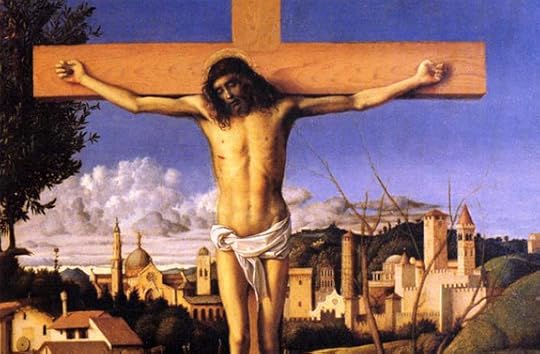
"The Crucifixion" by Giovanni Bellini (1501-03)
A Scriptural Reflection on the Readings for Sunday, Nov. 24, 2013 | The Feast of Our Lord Jesus Christ, King of the Universe | Carl E. Olson
Readings:
• 1 Sam 5:1-3
• Ps 122:1-2, 3-4, 4-5
• Col 1:12-20
• Lk 23:35-43
“Eighty and six years have I served Him, and He never did me any injury: how then can I blaspheme my King and my Saviour?”
Those words were uttered in the mid-second century by St. Polycarp, bishop of Smyrna and one of the Apostolic Fathers. Polycarp was burned at the stake and pierced with a sword for refusing to burn incense to the Roman emperor. What did those who killed Polycrap think about his final words? Did they stop to wonder, “Who is this king he is willing to die for?” Or to ask, “Where is this king and his armies? Where is his kingdom?”
In Quas Primas, his 1925 encyclical that introduced the Feast of Christ the King, Pope Pius XI reflected on the nature of the Kingdom proclaimed by Jesus Christ. His kingdom, the pontiff noted, “is spiritual and is concerned with spiritual things.” In proclaiming the kingdom of God, Jesus often had to strongly correct misunderstandings, especially from those who thought his rule would be based in political and military might, aimed at a violent overthrow of the Romans. When asked by Pilate, “Are you the king of the Jews?”, Jesus replied cryptically, indirectly: “You say so” (Lk. 23:3). He further explained, “My kingship is not of this world; if my kingship were of this world, my servants would fight…” (Jn. 18:36).
“This kingdom is opposed to none other than to that of Satan and to the power of darkness,” Pius XI emphasized, “It demands of its subjects a spirit of detachment from riches and earthly things, and a spirit of gentleness. They must hunger and thirst after justice, and more than this, they must deny themselves and carry the cross.” It is the scandal and the paradox of the Cross that reveals the kingdom, just as making the sign of the cross reveals those who love and worship the king.
The cross is a sign of contradiction; it separates those who sneer, jeer, and revile Jesus from those who behold, embrace, and adore him. Execution on a cross was not only violent and grim, it was a shameful and dishonorable. Yet, as Hans Urs von Balthasar wrote, “His enthronement as King will be complete on the Cross … And so he says, ‘Yes, I am a King.’ Not a king within a vanquished world but a King who sits on a throne exalted high above it. Exalted by the Cross.”
The cross divides mankind because it demands a choice, a judgment about the person of Jesus Christ. But having chosen the cross, the division ends and we are brought into union with the King and his divine life; we receive communion, partaking of his body and blood broken for us on the cross. The cross thus unites mankind, and the inner nature of the kingdom is revealed. As St. Paul wrote to the Colossians, in the Son “all things hold together. He is the head of the body, the church.” The church is intimately related to the Kingdom: “While it slowly grows, the Church strains toward the completed Kingdom and, with all its strength, hopes and desires to be united in glory with its King” (Lumen Gentium, 5).
The two criminals crucified with Christ personify the two options available to everyone. Both are sinners; both are able to look directly upon the King. But one sees only a fellow criminal—a target for angry, despairing mockery. Yet the other sees an innocent man; even more, he sees a King: “Jesus, remember me when you come into your kingdom.”
The true meaning of Christ’s kingship, states the Catechism, “is revealed only when he is raised high on the cross” (par. 440). Yet many will reject the King, enthroning themselves as rulers of their passing lives. Others, such as Polycarp, give themselves completely to the King who never does any injury, but instead delivers us from the power of darkness and transfers us into his eternal kingdom.
Carl E. Olson's Blog
- Carl E. Olson's profile
- 20 followers


